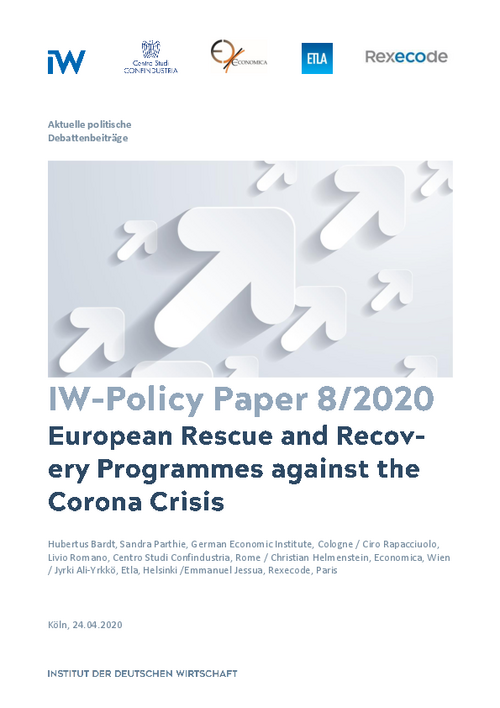The current crisis is different from the situation 2008/2009, but again it is a tremendous challenge for the economies across Europe. The Corona-crisis is hitting the economies symmetrically, though with differences in magnitude levels, while the 2009 crisis was primarily a crisis of the banking industry and the manufacturing sector.

European Rescue and Recovery Programmes against the Corona Crisis
IW-Policy Paper

The current crisis is different from the situation 2008/2009, but again it is a tremendous challenge for the economies across Europe. The Corona-crisis is hitting the economies symmetrically, though with differences in magnitude levels, while the 2009 crisis was primarily a crisis of the banking industry and the manufacturing sector.
This time, value chains are substantially affected. As the virus does not hit all countries at the same time, there will be distortions in the value chains over the next months.
The assessments on the impact on national GDPs range from a best-case scenario -5% for Germany to a worst-case scenario of -12% for Italy.
To deal with the impact of the crisis a European rescue programme is needed immediately, including bringing down infection rates and providing sufficient medical equipment and services.
Regarding the economic support, the comprehensive efforts by the ECB and the Commission, including loosening the rules concerning state aid and the provision in the context of the SURE programme for short time work are very welcome.
In a second phase, Europe will need a common recovery programme fostering economic development and coming back to sustainable growth quickly. Europe must secure open borders for goods, services and labour, which are crucial for the maintenance of the single market and for restarting cross-European value chains. Europe needs a large-scale and timely initiative to foster growth through public and private investments, focusing on health, technology, and the green economy.
The Green Deal should play a key role for the design of the economic recovery programme. The 1.5 trillion euro plan foreseen by the Commission is appropriate to address the challenge faced by European economies. However, to avoid asymmetric rebounds within the EU after the emergency, the European recovery plan must be implemented soon and in a coordinated fashion.
Weitere Beiträge und Studien zum Thema Corona

Hubertus Bardt / Sandra Parthie: European Rescue and Recovery Programmes against the Corona Crisis
IW-Policy Paper


Inflation in der Eurozone: Der Weg bleibt holprig
Die Inflation in der Eurozone befindet sich auf dem Rückzug. Ein Aufatmen wäre aber verfrüht. Zweitrundeneffekte im Arbeitsmarkt sind im vollen Gange und setzen die Geldpolitik weiter unter Druck.
IW
Trump oder Harris oder …? Worauf sich Europa einstellen muss
Wenige Monate vor der Präsidentschaftswahl in den USA hat Donald Trump gute Chancen auf eine Wiederwahl. Auf Seiten der Demokraten hat der amtierende Präsident seine Kandidatur nach langem Zögern zurückgezogen, Vizepräsidentin Kamala Harris wird mit hoher ...
IW